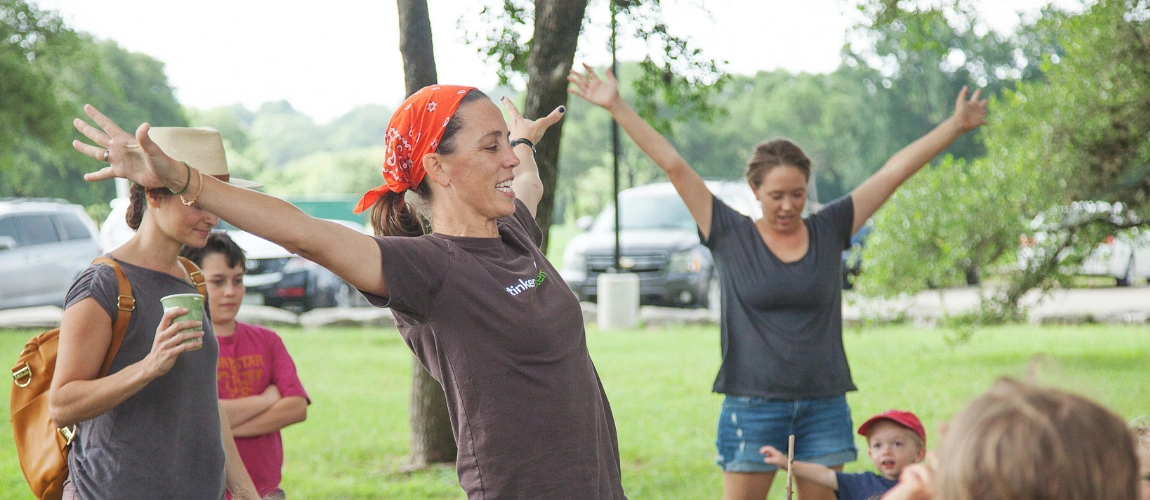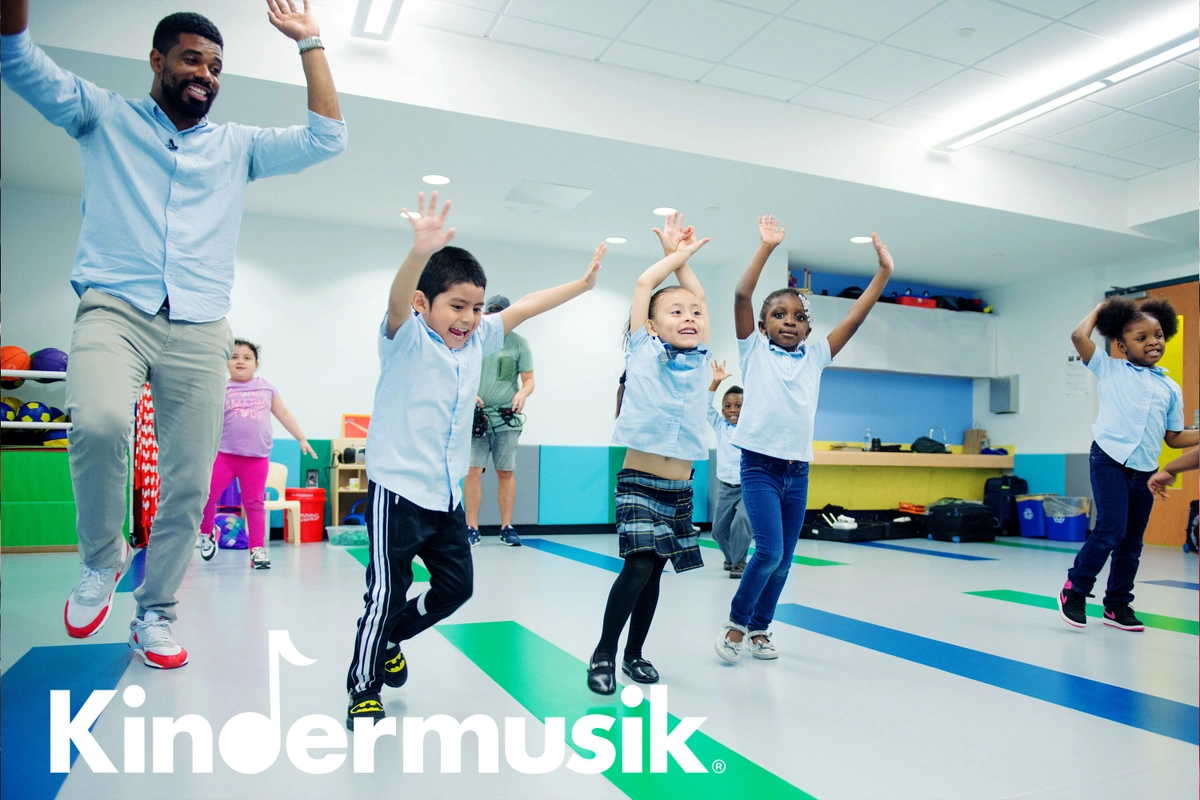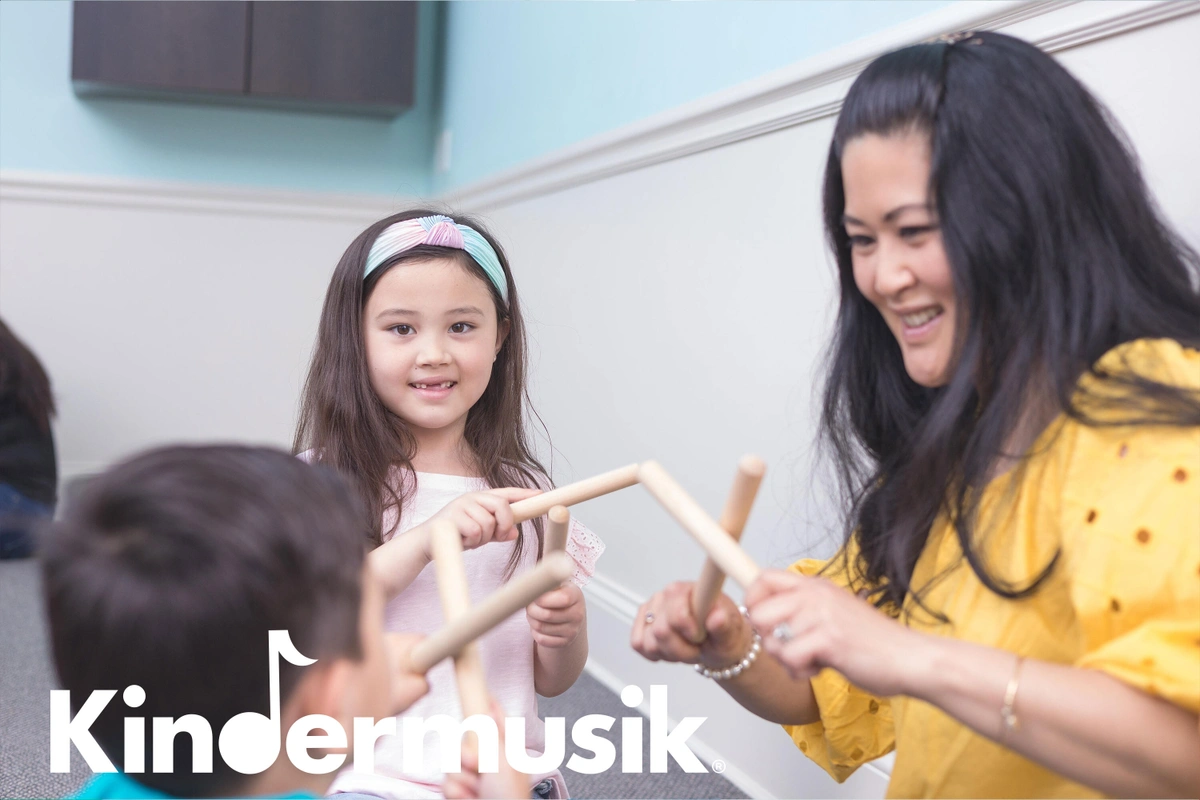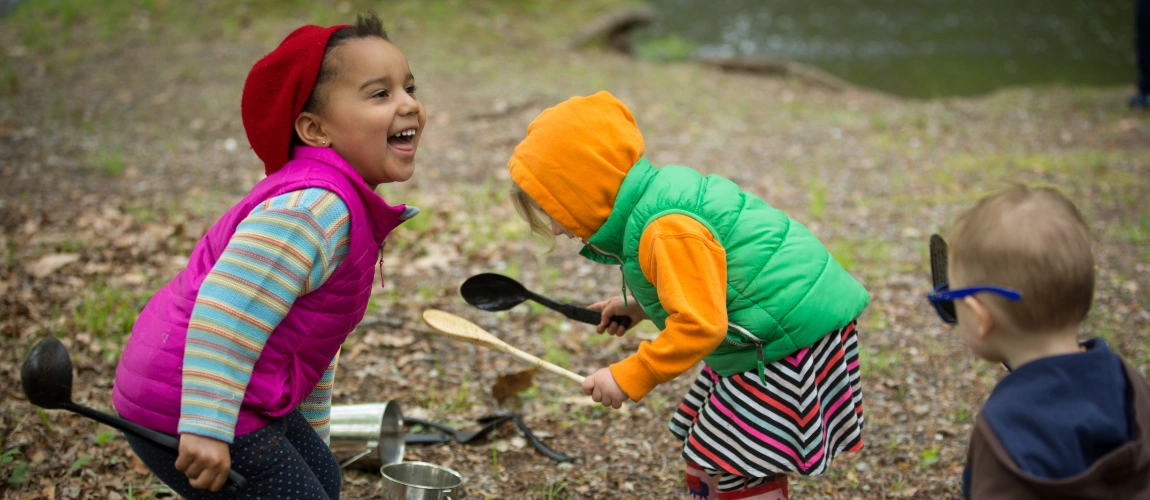From the start, sound, song and movement have been essential parts of how Tinkergarten teachers engage kids. In early learning, music is core to how we teach and how kids learn.
What is also a regular topic of our professional discourse with teachers? How we feel about music and how to balance our own musicality, kids’ responses to music and our teaching practice.
As early educators, we all navigate around myths about who is and is not musical as we each develop our way to bring music–a most powerful tool into the work we do.
I relish the discussions about this with colleagues and fellow Tinkergarten educators in our online teacher community. I’m also most grateful for the chance to pick the brains of experts in the field, like our friends at Kindermusik. Read on as the Team at Kindermusik helps us to dispel common myths and learn simple but powerful ways to use music in our teaching to supercharge developmental skills that are critical to children’s success in group settings, school, and life in general.
Myth: I’m not a musical person.
Fact: Everyone is musical.
You may not have perfect pitch or the ability to tap out a complicated drum solo, but you were born with a rhythmic beating heart and your brain is pre-wired to search for patterns—in fact, research shows fetuses may begin to recognize their mother’s singing patterns beginning in the third trimester.
Everyone’s innate musicality—especially children’s—can be strengthened to amplify cognitive, physical, and social-emotional development.
So, where do you start?
Try these easy and immediate ways to boost whole-child development with music.
Use Musical Play to Practice Listening Skills
Sound is constantly competing for our attention, and for young children, it can be overwhelming. But it’s not really about hearing—hearing is a sense. It’s about listening, and listening is a skill.
The ability to identify and focus on a specific sound is key to formal learning success (think: focusing on the teacher’s voice in a noisy classroom).
Music can help strengthen listening skills in an easy and memorable way.
If you want to practice, try “On the Farm” on the free Kindermusik app (search for the title or browse to the animal theme). Play it and ask little learners to:
- Identify each animal sound.
- Then, have them move like the animal they hear.
- Last, have them pick out sounds during the instrumental parts and recreate them. For example, at :55, you could say “Listen to the clip-clop of the horse hooves! Show me what that looks like with your feet…I see you galloping like a horse! Now try tapping it on your body…”
By focusing on each sound, kids are following directions, connecting visuals to vocabulary, and interpreting tasks.
Tinkergarten teachers, you can apply this by using call-and-response when we teach any new verse of the Come to Tinkergarten song. Sing a line while kids listen. Then, repeat that line together. Start with just the singing. Then, add the movement as you bring it all together.
Preschool with a Purpose teachers, try focusing on helping kids listen to learn each week’s new Welcome Song.
Use Musical Play to Practice Self-Control
Another skill that often gets misrepresented as an inherent trait is self-control. That’s just one of the executive function skills that are important for overall whole-child development, and those skills are strengthened through experience and practice.
Children who practice self-control are often more in charge of their bodies and able to follow verbal directions more easily.
Stop-and-go musical activities and games—like freeze dance—make practicing this skill positive and fun!
Tinkergarten teachers, you can use games like our Tinkergarten “Bell Game” to practice this, too!
Use Musical Play to Ease Transitions
Moving from the opening circle to launching a play lesson, leaving the playground, quieting down from play time to nap time…transitions like these can be so tricky for kids (and exhausting for adults)!
Transitioning from one activity to the next does get easier with age, but it gets easier faster with a little musical help.
Even babies prefer singing voices to speaking ones, and research suggests it holds their attention twice as long. For older toddlers and preschoolers, using a familiar tune during transition times can help both capture their attention and empower them to imitate the task.
For example, the struggle to get little ones to clean up their toys can be a battle. Instead of convincing them with words, try a familiar tune that 1) communicates safety and triggers a dopamine release, 2) creates a ritual that you both look forward to, and 3) gives them the confidence to complete the task on their own.
To the tune of “The Mulberry Bush”
This is the way we clean up our toys,
Clean up our toys, clean up our toys.
This is the way we clean up our toys,
After we play.
And this is just the tip of the iceberg. Once you see success with one transition, use the same tune but change the words for a new directive. See this great reel of a song to help kids put on their coats (or clothes, shoes, etc).
Tinkergarten teachers, you can use many of the songs in the Kindermusik App to support transitions like the wild shift from guided play to clean up, and the Come to Tinkergarten song is always a beloved signal to come back to circle up, too!
Use Musical Play to Build Confidence
When we think of confidence for 3-5-year-olds, creativity doesn’t always spring to mind, but here’s the thing…children love being part of the creative process, and giving them a musical platform to express their ideas is one of the best ways to build confidence early.
Whether it’s in a class or one-on-one, demonstrate the energy you want them to have and then let them run with it!
When it comes to singing with confidence, one of the most important pieces of the puzzle is choosing a song in a high pitch.
Why?
Children hear in higher pitches or “head voices.” If they can’t hear all of the words to a song, they can’t interpret or imitate it, and if they can’t interpret or imitate it, they become disinterested.
Check out “Open Them, Shut Them” on the free Kindermusik App (in the “Body” playlist). That’s a great starting point that’s:
- Easy to imitate
- Easy to memorize
- Easy for them to lead (and you follow their movements)
Use Musical Play to Support Themed Learning
Joy is the heart of music, and joyful learning moments make the learning stick. Using musical play activities to support concepts that are being taught in the classroom or home is a great way to boost conceptualization and retention.
For example, learning about amphibians? “The Little Green Frog” activity from the digital Kindermusik Resources subscription pairs a song with visuals, sign language, and more to help solidify vocabulary and animal knowledge while amplifying fine-motor skills and other developmental milestones (Try these resources for free, too).
Tinkergarten teachers, your featured creature verses and movements help kids retain what we learn about the superpowers of animals and plants.
Sing and Dance Like Little Kids are Watching!
No matter how you put these insights to practice, remember that, among all of the developmental skills music can teach, music brings the joy. And, no matter how you sound or move, sing and dance like little kids are watching. I have found that makes all the difference!
Gratitude to our friends at Kindermusik for sharing these insights and strategies. May they help you support learning in the kids you love and teach! If you’re curious to learn more about how Kindermusik supports teachers, try a free 7-day trial of Kindermusik Resources or check out their full curriculum kits. And if you’re interested in classes for families, you can search for live virtual or in-person experience near you.
What is Kindermusik?
Kindermusik provides music and movement education for children ages 0-7 to teachers of all kinds (not just experienced “music” teachers). Their research-based curricula is “rooted in the power of shared musical play including singing, instrument play, dance, and more.” They believe that musical play is “the ultimate multisensory experience, lighting up every part of the brain—and, when it happens in a group setting, joy is heightened, the learning sticks, and whole-child development gets a major boost.”




